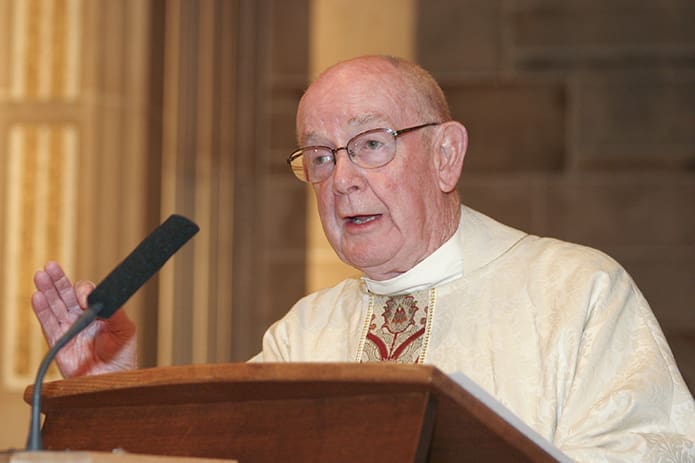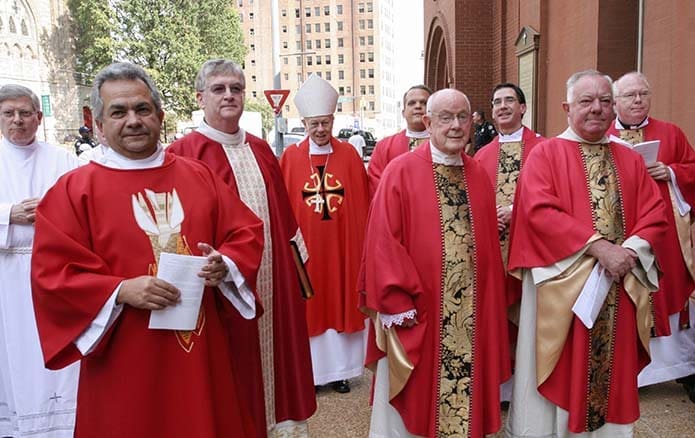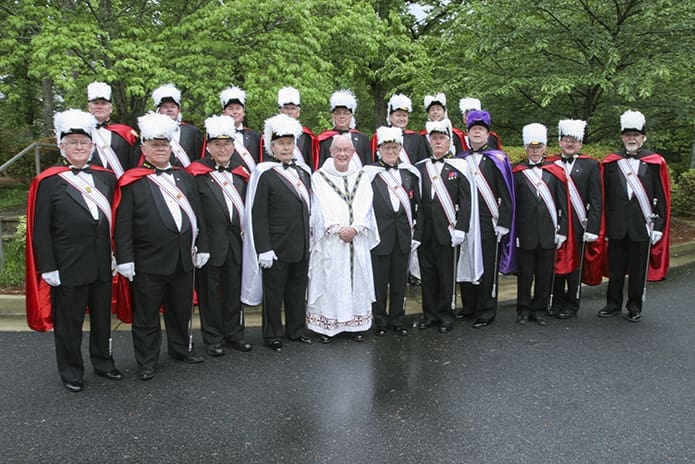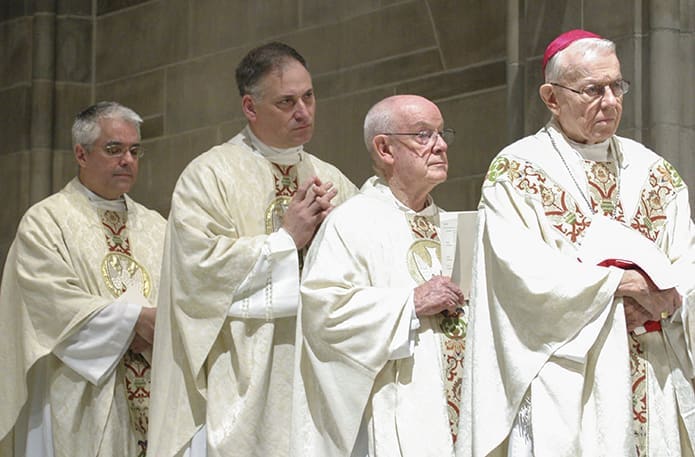Msgr. R. Donald Kiernan stands among various members of law enforcement at the Georgia State Capitol. On the same day, March 8, 2011, Msgr. Kiernan was honored by the House of Representatives and the State Senate. Photo By Michael Alexander
Dunwoody
Atlanta’s most senior priest remembered as a ‘joy-filled man’
By GRETCHEN KEISER, Special to the Bulletin | Published January 25, 2018
DUNWOODY—Msgr. R. Donald Kiernan was remembered Jan. 19 as a dedicated pastor, a chaplain to Georgia’s first-responders and a life-loving personality who was part of the transformative growth of the Catholic community and the Atlanta region over the last 68 years.
The most senior priest of the Atlanta Archdiocese died at the age of 93 on Jan. 9. His funeral Mass, delayed two days by snowy weather, was celebrated Jan. 19 at All Saints Church in Dunwoody, where he was pastor for 25 years. A vigil service of evening prayer was held there Jan. 16.
When Msgr. Kiernan was ordained in May 1949 for the Diocese of Savannah, the Atlanta Archdiocese hadn’t even been established. The population of the metro Atlanta region was around 725,000 people, one-eighth of what it is today at 5.8 million people.
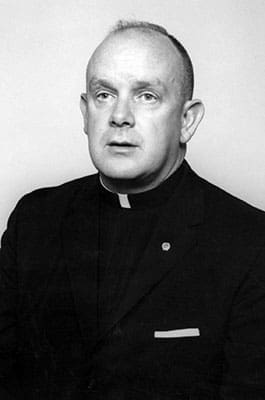
Massachusetts native Msgr. R. Donald Kiernan was ordained a priest May 4, 1949. His first assignment in Georgia was at the Cathedral of St. John the Baptist, Savannah. His first Atlanta assignment was at the Shrine of the Immaculate Conception, Atlanta.
He served under every bishop of Atlanta, from the first, Bishop Francis E. Hyland, to Archbishop Wilton D. Gregory. In addition, the gregarious priest from Massachusetts made friends in Georgia at every crossroads where he served. At a time when Catholics were a small minority in the state, facing prejudice and ignorance of the church, Msgr. Kiernan had friends at the statehouse, in the police precincts and at the neighborhood pubs and restaurants.
Unofficially, “he was probably the best public relations person the diocese ever had,” Msgr. Edward J. Dillon said.
“He never met a stranger,” said his longtime friend, who presided at the vigil service.
Speaking to a full church at the funeral Mass, three people gave their perspectives of Msgr. Kiernan’s broad impact across so many years. Bishop Bernard E. Shlesinger III was the principal celebrant, with over 50 priests concelebrating the Mass. A single guitarist and soloist, Mike and Mary Peterson, led the congregation in the music, which reflected his Irish heritage. Members of the parish Knights of Columbus Council 11402, of which he was a member, formed an honor guard.
Homilist Deacon Bill Garrett, who served with Msgr. Kiernan at All Saints Church, said he was a “joy-filled man” who “believed in Jesus and wanted to share that love with others.”
When Deacon Garrett approached him about serving as a deacon at the parish, Msgr. Kiernan warned him, “I’ve been a priest for 59 years and I have done things pretty much the same for 59 years. Are you OK with that?”
“He was a man of habit,” the deacon said.
It was difficult for Msgr. Kiernan to retire as pastor of All Saints Church in 2011, but “perhaps his best preaching was in the waning years of his life, preaching not with words but actions,” Deacon Garrett said.
“He went to the Lord often for his strength and encouragement,” he said.
“He accepted the sufferings and indignities that often accompany age and illness,” celebrating Mass at the parish with difficulty for the last time about three months ago, with the assistance of Msgr. Hugh Marren, the pastor.
“A parishioner said, in monsignor’s suffering he could see Christ himself,” Deacon Garrett said.
His favorite Scripture was “come to me all you who labor and are overburdened and I will give you rest.”
Friends from all over
Beginning his priestly service in Savannah, as an assistant pastor at the Cathedral of St. John the Baptist in 1949, the young priest from Taunton, Massachusetts, was then sent to the Shrine of the Immaculate Conception in Atlanta in 1951. During that time, the church’s location next to the state Capitol brought him near to legislators, the mayor and police chief and the governor.
He became particularly friendly with Atlanta Police Chief Herbert Jenkins and Atlanta Mayor William B. Hartsfield, Msgr. Dillon said, and the mayor regularly ate lunch at the shrine. His later work as a Georgia State Patrol chaplain brought him into contact with the governors.
In the early 1950s, the Lebanese Catholic community worshipped at the shrine. Msgr. Kiernan began a lifelong friendship with their families that continued after the Melkite Catholic Church, St. John Chrysostom, was dedicated in Atlanta. His photo hanging on the wall at Manuel’s Tavern was a sign of his continuing closeness to the Maloof family, according to a tribute posted on social media after his passing.
When the Atlanta Diocese was established in 1956, Msgr. Kiernan was assigned to it. His service over decades extended across the breadth of the new diocese, from St. Peter Church in LaGrange to St. Anna Church in Monroe, St. Michael Church in Gainesville and St. Bernadette Church in Cedartown. He was also pastor of St. Anthony of Padua Church in Atlanta, St. Jude the Apostle Church in Sandy Springs and Immaculate Heart of Mary Church in Atlanta, each with a parish school. His last pastorate at All Saints, beginning in 1985, was his longest in one location. Many parish structures were planned and built while he was pastor. He also welcomed Chinese Catholics to begin meeting at All Saints, fostering the growth of this community which now has a dedicated mission, Holy Name of Jesus, in Norcross.
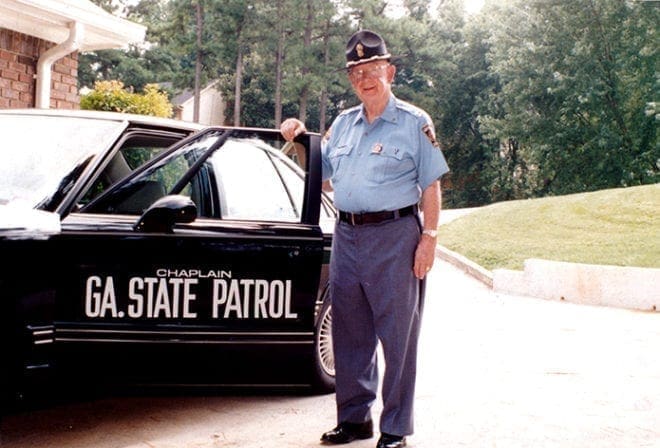
In addition to serving as a chaplain for the Georgia State Patrol, Msgr. R. Donald Kiernan was a chaplain to the DeKalb County police, Metro Atlanta police, Federal Bureau of Investigation and local division of the Bureau of Alcohol, Tobacco and Firearms. Photo By Michael Alexander
In addition to being a pastor, he was asked to help simultaneously with various archdiocesan departments and ministries. He was editor of The Georgia Bulletin from 1956 to 1962, writing his folksy “Georgia Pines” column about the new diocese and its parishes. He continued as a consulting editor until 1968 and as acting editor from 1968 to 1969. Msgr. Kiernan was named a monsignor in 1969.
He assisted in the Metropolitan Tribunal where marriage cases were considered, in Catholic education and in priest personnel. From 2000 to 2005, while at All Saints he was also one of the vicars general of the archdiocese.
Alongside this, Msgr. Kiernan from the start of his priesthood ministered to those in law enforcement in Georgia. He helped to found police associations and chaplaincies, including the Georgia Association of Chiefs of Police, and served as a chaplain to local and state police agencies, including Atlanta, DeKalb County, the Georgia State Patrol and the Georgia Bureau of Investigation.
Vernon Keenan, director of the GBI, who attended the funeral Mass, said he and Msgr. Kiernan had been friends for 40 years. The priest and a Baptist minister from Macon started the chaplaincy program for law enforcement in Georgia where none previously existed, Keenan said. Chaplains provide spiritual and emotional support to officers and assist with death notifications and in other roles. Msgr. Kiernan told him his interest in their work began when he was a priest in Savannah and was invited to ride with officers there.
“He was always viewed as a police officer. The police always accepted him as one of their own,” Keenan said.
His “great sense of humor” hit home with those in uniform, who needed that same type of humor to do their jobs, he said. They knew him as “monsignor,” but he served people across all faiths. “We never thought of him as being a priest. He was a chaplain,” Keenan said.
Msgr. Dillon, also a police chaplain, said, “If he went on a trip and didn’t get stopped one or two times by the police, it was a failure.”
When agencies had to deal with the horror of the uncared-for human remains at the Tri-State Crematory in north Georgia, Msgr. Kiernan came to “check on the first responders” and brought the archbishop, Keenan said. He was a phone call away when needed, Keenan said.
Those he served came first
The GBI director without the priest’s knowledge nominated Msgr. Kiernan for an honorary doctor of law degree he received at Georgia State University. It was one of several given during his lifetime, leading to his nickname as “Doc” Kiernan. Others were from Biscayne College in Miami Gardens, Florida, and Providence College in Providence, Rhode Island, his alma mater.
Chris Harvey, a director in the Office of the Georgia Secretary of State, spoke at the conclusion of the funeral. He said he knew Msgr. Kiernan first as his boyhood pastor at St. Jude and later as a DeKalb County police recruit at the academy where the priest’s message “never left my conscience.” The message was to “be sincere” in his work and recognize that those he would serve would come first.
The priest always started his homilies with the phrase “my dear people,” Harvey said, and began with a story or a joke before making the sign of the cross and preaching the homily itself.
“He did not take himself too seriously,” he said.
He said that the priest and first responders had a natural friendship because they recognized each other’s vocations.
“Everyone who ran toward the danger, the darkness … had a special place in his heart,” Harvey said.
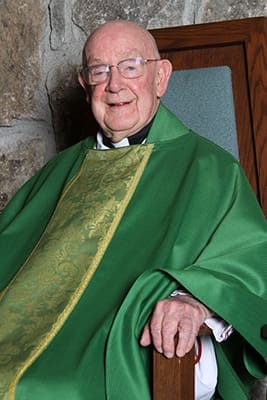
Msgr. R. Donald Kiernan arrived in Atlanta on Nov. 16, 1951. He served as the pastor in Cedartown, Gainesville and Atlanta between 1956 and 1985. His last pastoral assignment was at All Saints Church, Dunwoody, the site of his Jan. 19 funeral. Photo By Michael Alexander
“Monsignor loved the frontline public servants because he lived his life in the same way. … He knew the vast majority … did their jobs out of a sense of vocation,” he said.
While he related to people as they were, “he wanted you to know how holy you could be,” Harvey said.
To the delight of the congregation, eulogist Dave Fitzgerald reprised the familiar voice of Msgr. Kiernan, whose Massachusetts accent was unchanged by living for six decades in the South.
They had lunch frequently since the priest retired to St. George Village in Roswell and Fitzgerald said it gave him a “fabulous ringside seat” to hear the stories of his life. He cited Joan McIvor, a longtime staff member to the priest at All Saints and his caregiver and friend, for keeping his life full of “fun and joy,” through events like dinner and lunch reunions with surprise guests.
Born on Dec. 28, 1924, Msgr. Kiernan was the son of Thomas and Lena Doherty Kiernan. He wanted to be a priest since childhood. As a young man, he briefly tried study in a Dominican seminary but left almost immediately for several reasons, Fitzgerald said, including the impossibility of him keeping a vow of silence. This disappointment was compounded when his home diocese of Fall River, Massachusetts, did not accept him as a seminarian.
However, Mount St. Mary’s Seminary in Emmitsburg, Maryland, did accept him. There he met and was recruited for Georgia by Msgr. P.J. O’Connor, a legendary vocations director who was seeking priests to serve in the understaffed mission region.
When Msgr. Kiernan was ordained a priest on May 4, 1949, by Boston Cardinal Richard Cushing and came to Georgia, there were 33 Catholic priests in the state, Fitzgerald said.
“He served us all with distinction, with gratitude and with joy,” Fitzgerald said. “So many times he said ‘If there ever was a happy priest, you’re looking at him.’”
“He was deeply, deeply good, and he made those around him feel deeply, deeply good,” Fitzgerald said.
The procession out of the church concluded with a ceremony by an honor guard from DeKalb County Police and the Georgia State Patrol, including the playing of taps and folding of the American flag. At a reception afterward, hundreds of people shared a meal and memories that would fill many time capsules.
Donations in memory of Msgr. Kiernan may be made to Our Lady of Perpetual Help Home, 760 Pollard Blvd., SW, Atlanta, GA 30315 or www.olphhome.com.
